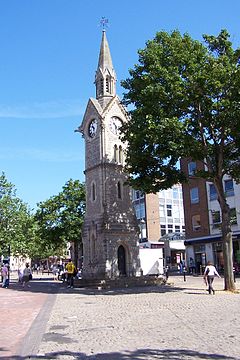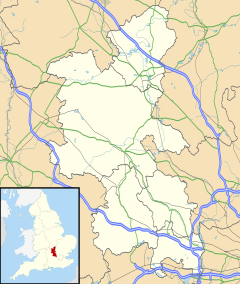Aylesbury, Buckinghamshire
| Aylesbury | |
|---|---|
 Kingsbury, Aylesbury |
|
 Aylesbury Clocktower |
|
| Aylesbury shown within Buckinghamshire | |
| Population |
71,977 (2011) Urban area 74,748 Aylesbury Vale district 174,900 |
| OS grid reference | SP818138 |
| • London | 36 miles (58 km) |
| Civil parish |
|
| District | |
| Shire county | |
| Region | |
| Country | England |
| Sovereign state | United Kingdom |
| Post town | AYLESBURY |
| Postcode district | HP17 HP18 HP19, HP20, HP21 |
| Dialling code | 01296, 01844 |
| Police | Thames Valley |
| Fire | Buckinghamshire |
| Ambulance | South Central |
| EU Parliament | South East England |
| UK Parliament | |
71,977 (2011) Urban area 74,748
Aylesbury /ˈeɪəlzbri/ is the county town of Buckinghamshire, England. In 2011, it had a population of 71,977 but the greater urban area had a population of 74,748.
The town name is of Old English origin. Its first recorded name Æglesburgh is thought to mean "Fort of Ægel", though who Ægel was is not recorded. Since earliest records there have been 57 variations of the name.
Excavations in the town centre in 1985 found an Iron Age hill fort dating from the early 4th century BC. Aylesbury was one of the strongholds of the ancient Britons, from whom it was taken in the year 571 by Cutwulph, brother of Ceawlin, King of the West Saxons; and had a fortress or castle "of some importance, from which circumstance probably it derives its Saxon appellation".
Aylesbury was a major market town in Anglo-Saxon times, the burial place of Saint Osgyth, whose shrine attracted pilgrims. The Early English parish church of St. Mary (which has many later additions) has a crypt beneath. Once thought to be Anglo-Saxon, it is now recognised as being of the same period as the medieval chapel above. At the Norman conquest, Norman Lamb took the manor of Aylesbury for himself, and it is listed as a royal manor in the Domesday Book, 1086. Some lands here were granted by William the Conqueror to citizens upon the extraordinary tenure that the owners should provide straw for the monarch's bed, sweet herbs for his chamber and two green geese and three eels for his table, whenever he should visit Aylesbury.
...
Wikipedia

